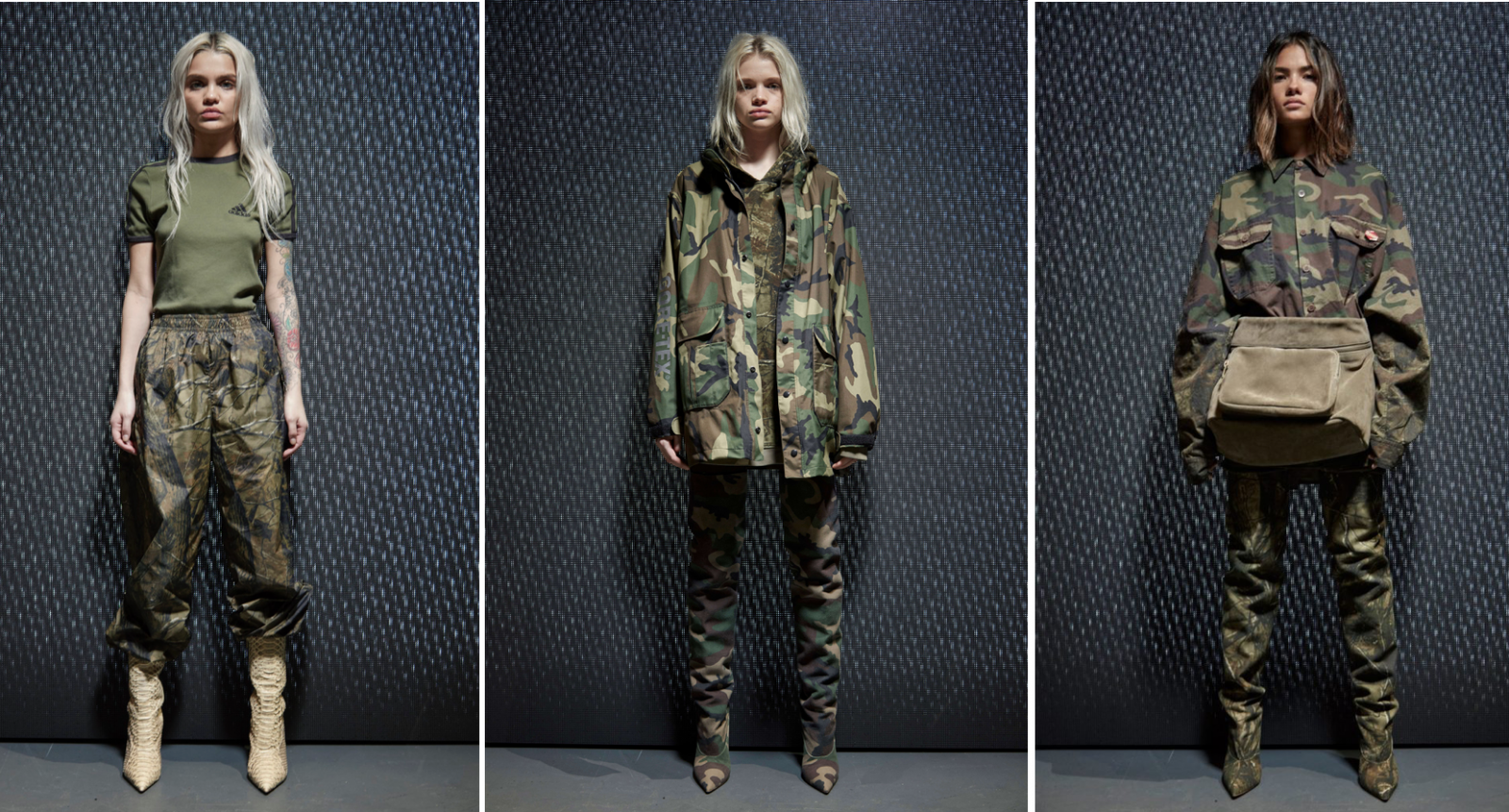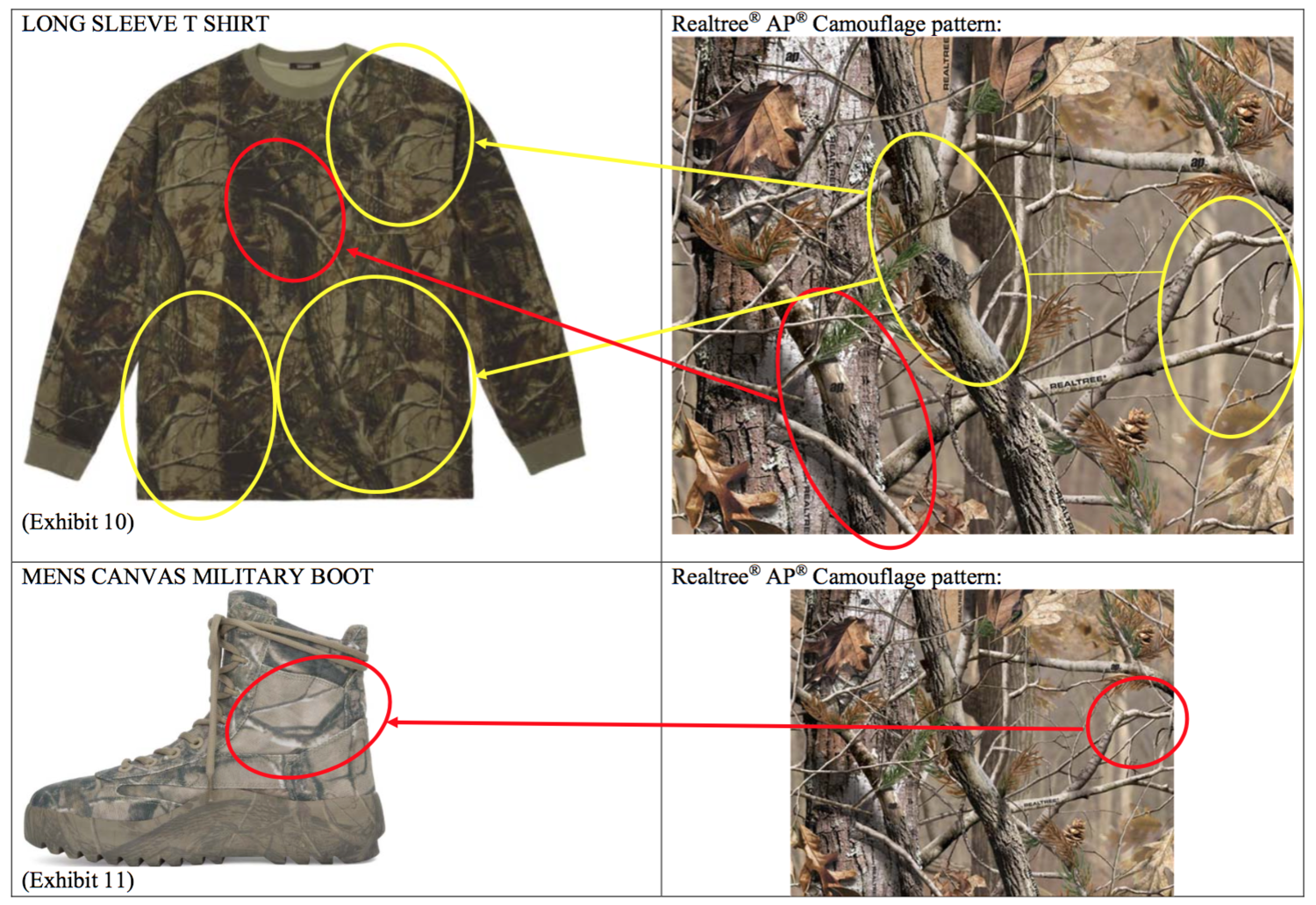
image: Yeezy
Kanye West’s Yeezy brand is not going down without a fight in the copyright infringement lawsuit filed against it this spring. You may recall that in March, just a month before West urged his Twitter followers to “feel free to take ideas and update them,” Columbus, Georgia-based, Jordan Outdoor Enterprises (“JOE”) alleged that West took a handful of its copyright-protected camouflage prints for his Yeezy Season 5 collection but did not bother to make any updates.
JOE, which owns hunting company Realtree, claims that the prints on the Yeezy Season 5 garments and accessories – from hoodies and pants to high heels and men’s boots – are “substantially similar” to its original camo prints, including its Realtree® line of camouflage patterns, which are “among the most famous and well-known camouflage patterns in the camouflage industry in the United States and throughout the world.”
But Yeezy did not merely copy JOE’s copyright-protected patterns, according to the complaint. The company alleges that as a result of language on Yeezy’s website the brand is “misleadingly and falsely represents” that ” all materials and content … [is] owned by us, or used by us under authorization, and [is] protected by U.S. and foreign trademark and copyright laws.” However, as JOE asserts, Yeezy “is not authorized to use, nor does it own, any of the JOE copyrights or trademarks at issue in this action.”

Yeezy Season 5 camo (left) & JOE’s Realtree camo (right)
Well, as of last month, attorneys for West’s brand are pushing back against JOE’s suit. In Yeezy’s answer, which is the formal filing in response to JOE’s complaint, counsel for West and UNKNWN, basketball star Lebron James’s Florida-based fashion outpost, which was stocking some of the allegedly infringing product, denies that the Yeezy brand made unauthorized use of JOE’s camo prints, and asserts 16 different affirmative defenses to JOE’s copyright infringement claims … just in case Yeezy is found to have copied the hunting company’s prints.
(Note: Affirmative defenses are facts other than those alleged by the plaintiff (JOE in this case) – which, if proven by the defendants (Yeezy and UNKNWN here), that defeat or mitigate the legal consequences of the defendants’ otherwise unlawful conduct).
Among those defenses, Yeezy claims that JOE “has not demonstrated ownership of valid copyright registrations for the allegedly and infringed [JOE] camouflage patterns,” and that even if JOE can establish that it does have valid copyrights for the camo prints, those rights are thin and JOE “cannot establish infringement under the principles governing thin copyright.”
The answer asserts that even if Yeezy “infringed any copyright interest allegedly held by [JOE], [the brand] did so with innocent intent.”
And still yet, Yeezy asserts that no matter what, JOE should be barred from obtaining damages and injunctive relief due to the doctrine of unclean hands, a defense that asserts that the plaintiff (JOE in this case) has acted in bad faith in connection with the subject of the complaint. Here, it seems, that Yeezy is arguing that JOE acted in bad faith by claiming that it is “the owner and/or author of the [camo designs at issue],” when it is not.
In addition to injunctive relief – which would see the court order Yeezy and Yeezy stockist Unknwn to cease all manufacturing, marketing, and sales of the allegedly infringing products, and to turn over or destroy all existing infringing products), JOE is seeking monetary damages, including statutory damages in accordance with the Copyright Act and lost profits, among others.
UPDATED (AUGUST 14, 2018): Yeezy is going at the case as the lone defendant now. According to the case’s docket, UNKNWN was dismissed from the case in connection with an unopposed motion to dismiss was filed in July and the court issued a order granting the dismissal of UNKNWN on August 14.
* The case is Jordan Outdoor Enterprises, Ltd. v. Yeezy Apparel, LLC et al, 4:18-cv-00053 (M.D. Ga.).











